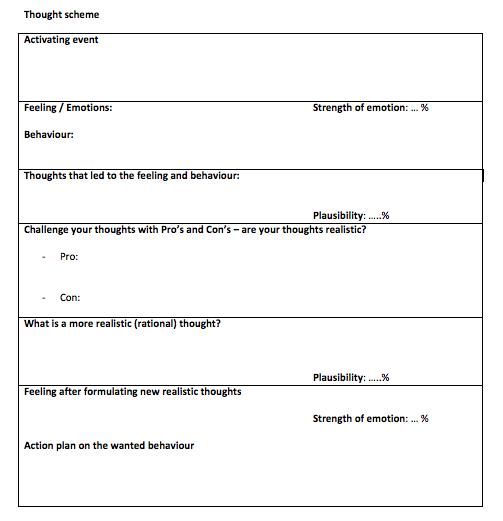There is a famous quote by Buddha – “The mind is everything and what we think we become” some skepticals don’t believe this is a quote from Buddha, and you know what, it doesn’t matter from who the quote is. It is just a very strong and powerful quote.
As already mentioned in a couple of other blogs, cognitive behaviour therapy helped me the most to overcome my burn-out. The mind is great but also one of the most dangerous and self-destruction piece of our human body. The first thing I learned during the cognitive behaviour sessions is that we really feel what we think, we think in visuals and words and that is connecting our behaviour and our feelings. When you are afraid of a spider, you ‘see’ the big hairy spider in your mind and your mind is even saying the words, “big hairy spider” and only by seeing the image and “saying” the words you are feeling anxious even when such a spider is not even nearby. This example shows how your thoughts, feelings and behaviour are so well connected.
Why is it that two persons in the same (for example stressful) situation can react and behave completely different? The short answer is that one person is thinking irrational and the other one has the ability to think rational. One cognitive behavioural therapy is called RET – Rational Effective Training. During my burn-out I mainly focused on the RET therapy.
One big conclusion about irrational thoughts is that these kinds of thoughts don’t help you to reach your goal. For example if I tell myself that during my working day I’m not allowed to make mistakes, I will not function better because I only think about, “o my god I’m not allowed to make mistakes”. This thought make me even function worse in most cases.
A couple of well known irrational thoughts:
- Unhealthy perfectionism; like the example above, when you tell yourself that you are not allowed to make a mistake. Perfectionism can be good, but the danger lies in the exaggeration of the perfectionism.
- Disaster thinking; By every potential thing that can go wrong you think it is the end of the world, like if your boss says something harsh to you, you immediately think that you will get fired.
- Low frustration tolerance; when you don’t like a task and already think that you can’t do it. The idea is that you think life must be much easier. Things in life are not always easy but you can do it – most people give up to easily.
- Addiction to love and respect; some of us don’t realise but they want that the whole world loves them and they want to be seen as a nice person. Trust me you can’t be everybody’s friend.
- Demands on the world; this is related to the irrational demand we have of other people around us and in the world. You want that others behave like you want them to do. For example, “Wars are not allowed to exist”. These irrational thoughts are linked to the circle of influence
ABC tool of cognitive behaviour therapy
Activating event; what happened
Believe; our ideas and thoughts
Consequence; feelings, emotions and behaviour
A -> B -> C
We all make the mistake that we think and blame the activity for our feelings (emotions) and behaviour but in reality it is our ideas and thoughts (Believes) that causes your feelings (emotions).
The five main stress emotions / feelings are:
- Fear
- Anger
- Depressions
- Guilt
- Sadness
How can we train ourselves in rational thinking and stop all unnecessary irrational thinking that causes us so much pain, stress and negative feelings and have more positive and happy emotions?
This is possible in a 3-step process with a purpose to change your thoughts.
- Analyse; which thoughts are making you unhappy
- Change; replace your irrational thoughts with rational thoughts
- Integrate new thoughts; through training you can learn to focus on rational thoughts hence you can change your behaviour
Since this is serious shit I urge you to take the time and don’t speed up in these steps, especially step 2 and 3 can take weeks or even month. Hang in there it will work in the end, just make sure you take all the time and discipline for you to get familiar with this change in thinking.
First thing is to analyse your thoughts by asking yourself three questions:
- Are my thoughts based on facts? Is it really true what I think and can I prove that this is true?
- Are these thoughts helpful in reaching my goal? Set your goal and ask yourself the question
- Philosophical questions like, are these thoughts logical and in line in how I want to live my life
For every irrational thought you should ask yourself these three questions. Please find one example below based on “Unhealthy perfectionism”:
Thought: I’m not allowed to make a mistake, because when I do so, I’m a dumbass
First questions based on facts:
- Who says that I’m not allowed to make a mistake?
- Can I do this task without a mistake?
- What is actually a mistake?
Second questions based on my goal:
- Does my thoughts really help to reach my goal?
- Can I be better with these thoughts in my mind?
Third questions based on Philosophical questions:
- Am I suddenly less valuable when I make a mistake?
- What makes me a dumbass when making a mistake?
- Is there anybody in the world that can do this without (small) mistakes?
The analysing part is crucial because you need to see that your thoughts are irrational and once you realise that, you can go to step two and replacing the thought with the thoughts and behaviour you want in such a situation.
One trick I learned to understand and question my irrational thought is to “challenge” them. Write down all the pro’s and Con’s of these thoughts and you will see that they are not rational.
I used a very simple thought scheme, first in MS word, later in Evernote and since I’m trained (step 3) I can actually do it on the fly in my head. When you at that stage you have made an amazing progress in stopping irrational thinking.
Thought scheme in an 8-step process
- Activating event (A)
- Feeling / Emotions (C)
- Behaviour (C)
- Thoughts that led to the feeling and behaviour (B)
- Challenge your thoughts with Pro’s and Con’s – are your thoughts realistic?
- What is a more realistic (rational) thought? (New B)
- Feeling after formulating new realistic thoughts (New C)
- Action plan on the wanted behaviour
See example below:

As said, it will take a lot of practice but ones you know how to replace your irrational thought by rational thoughts it will give you all the freedom and happiness to live the life you want and deserve, because don’t forget……You decide what you should think!
Photo by Marcos Paulo Prado on Unsplash

